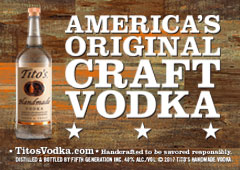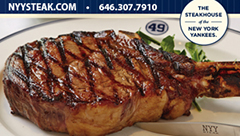MACCHU PISCO
Peru’s Finest
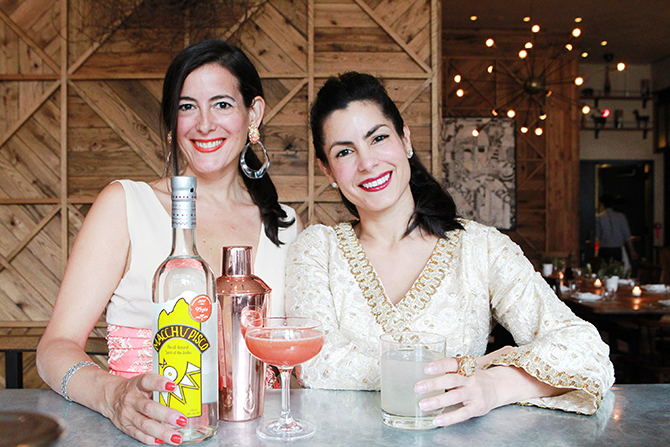
By Elizabeth Darwen
The Peruvian-born philanthropist and entrepreneur Lizzie da Trindade-Asher is inspired by the strong women in her life who have influenced her involvement in some of the most venerable causes. In fact, at the 65th Anniversary of Harvard Law School admitting women students, alumna Lizzie delivered an impassioned speech to women graduates about the illusory idea of work/life balance. Her general philosophy has been that “trying to find a sense of balance will always throw you off-balance.” As a result, Lizzie throws herself into her philanthropic commitments, business endeavors, and family time.
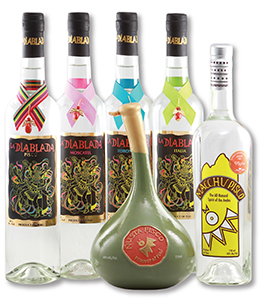
Since arriving in America at the age of 12, Lizzie and her family have held firmly to their Peruvian roots and culture. Namely, together with her sister, Melanie da Trindade-Asher, they have founded Macchu Pisco and introduced to the world Peru’s evident grape spirit. Cleverly named after Peru’s gem recognized as one of the Wonders of the World, Macchu Picchu, the company produces its award-winning gems of super premium, naturally distilled Piscos: Macchu Pisco, La Diablada, and Ñusta.
Together the two sisters had crafted an entirely new experience for discerning drinkers. And while this duo indeed cast a reverent eye at centuries-old Pisco producing traditions, Macchu Pisco’s brands are singular in their modern purity and complexity. They’ve been regarded as nothing less than revelatory by mixologists and the tasting panels such as the American Beverage Institute which awarded La Diablada, the highest point award of any pisco in the U.S. market.
IT’S ALL ABOUT FAMILY
Both sisters will tell you that first and foremost it’s a labor of love built around family. Over 100 years ago, Amelia Rodriguez, the matriarch of the family, was born. Growing up she helped her mother sell Pisco at their local bodega in Lima, Peru. Now a century later, her two granddaughters Melanie and Lizzie created arguably one of the world’s best Pisco companies in her honor, and their La Diablada Pisco, a blend of four grape varietals has been produced with her in mind.
Pisco is the pride of the Peruvians much the same way tequila is to Mexicans. Its story harkens back to the 1500s during the Spanish colonization of Peru. The Europeans brought with them grape vines for their own consumption and wine production. Peru’s wine industry flourished and became so competitive that the King of Spain, Felipe II, banned all imports. Jesuit priests saved the day when they brought distilling techniques to Peru, thus transforming the wine into what we now know as Pisco.
A LOVE FOR WHAT’S NATURAL
“We’re passionate about the creation,” Lizzie says. “When we started Macchu Pisco 13 years ago, no one in America knew what it was. We embarked on the path to make the most natural Pisco on earth and to bring prosperity to the people in our area of Peru.”
“Our work begins in the fields, the faraway pristine corners of Peru where we travel to select the purest grapes that have not been sprayed by chemicals,” says Melanie. And we encourage growers to be their best selves. Experience is everything. Macchu Pisco is all about the highs without the lows. When you compromise, you taste that compromise, and we never compromise.”
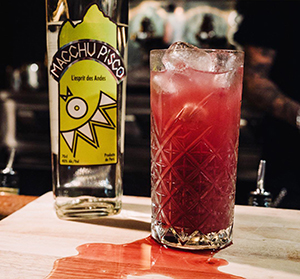
A graduate of Harvard Business School, Melanie set her sights on Pisco with the aim to create the world’s most significant expression of the spirit, and a dream to give back to one’s country. And while that may sound lofty, Melanie is nothing if not down to earth. She’s fond of sharing with you her adventures in the fields along-side the co-op of women grape pickers with whom the company works. Inspired by their arduous work, Macchu Pisco has now embarked upon introducing innovative farming techniques to eradicate the use of the pesticides and herbicides with the aim to ensure the health of the field workers and distill the most hyper-natural spirits in the world.
Macchu Pisco’s message of “drink right and do right” has been warmly embraced. Macchu Pisco has quickly ascended to become a must-have on cocktail menus across the globe—whether in classics or modern inventions or molecular mixology. Acclaimed restaurateurs like Nobu Matsuhisa, Jose Andres, Daniel Humm, and Eric Ripert have embraced Macchu Pisco and La Diablada. Daniel Boulud, no less, even included La Diablada in His and Her cocktail book.
For more information about Macchu Pisco, visit macchupisco.com





